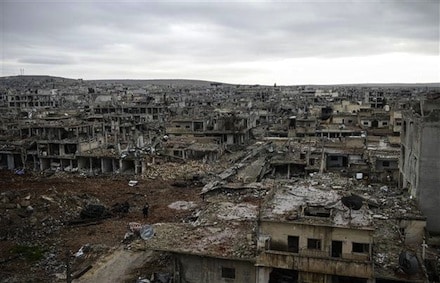It was necessary to destroy the Syrian town of Kobane (above) in order to save it from ISIS. The rubble and ruin of what was once a place more than 200,000 people lived is now free. Want to know the future of Mosul? Look to Kobane.
Destroying Kobane
Kobane once mattered nearly nothing at all, at least when ISIS was winning there in the face of NATO-ally Turkey choosing not to intervene. In October 2014, Secretary of State John Kerry, said preventing the fall of Kobani was not a strategic US objective. “As horrific as it is to watch in real time what is happening in Kobane, you have to step back and understand the strategic objective.” That objective was something about destroying ISIS’ command centers.
After the US abandoned the goal of bringing Turkey into the fight, and, against Turkey’s wishes, facilitated the movement of Kurdish forces across Iraq to attack Kobane, the city suddenly did become a US strategic objective. Speaking a little over two months after his earlier dismissive statement, Kerry said with the recapture of the Kurdish city of Kobane, ISIS was “forced to acknowledge its own defeat. Daesh – ISIL as some know it – has said all along that Kobane was a real symbolic and strategic objective.” Kerry continued to say that pushing ISIS out of Kobane was “a big deal.”
By all accounts, the over 700 airstrikes the US conducted on a round-the-clock basis on Kobane devastated the town. The civilian death toll has never been calculated. No plans to rebuild the city have been announced. Kobane was saved from ISIS by destroying it.
Vietnam, Vietnam, Vietnam
A famous quote from the Vietnam War was a statement attributed to an unnamed US officer by correspondent Peter Arnett, writing about Bến Tre city in February 1968: “It became necessary to destroy the town to save it.” The officer was talking about the decision to bomb and shell the town regardless of civilian casualties, to rout the Vietcong. The quote became garbled over time, eventually becoming the familiar, “We had to destroy the village in order to save it.”
The meaning of the phrase, as applied to Vietnam and to Kobane, is the same. What absurd value can be found in decimating a town in the cause of freeing it?
Kobane is Free
“Winning” in Kobane accomplishes nothing really. The city is destroyed. Over 200,000 refugees have been forced out, with questions about how they can ever return to resume their lives given such devastation. The decision not to intervene by the Turks exposed the fragility of the hastily assembled US coalition, setting up future confrontations among allies with very different goals and agendas for this war.
As an activist in the ISIS capital of Raqqa wrote, “People don’t look at Kobani and see a defeat, because everyone had to leave and the Americans bombed it to rubble to win.”
Meanwhile, as attention and limited resources were tied up in a battle of questionable strategic import, ISIS gains ground in Anbar, and continues to gather recruits from around the world. Kobane may very well end up as an example from this war noted by historians, as was Ben Tre from the Vietnam War, though perhaps not the one the US intended it to be.
Reprinted with permission from author’s website, We Meant Well.


